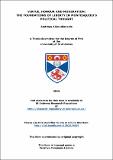Files in this item
Virtue, honour and moderation : the foundations of liberty in Montesquieu's political thought
Item metadata
| dc.contributor.advisor | Slomp, Gabriella | |
| dc.contributor.advisor | Lang, Anthony F. | |
| dc.contributor.author | Aktoudianakis, Andreas | |
| dc.coverage.spatial | 219 p. | en_US |
| dc.date.accessioned | 2016-11-28T14:55:05Z | |
| dc.date.available | 2016-11-28T14:55:05Z | |
| dc.date.issued | 2016-12-01 | |
| dc.identifier.uri | https://hdl.handle.net/10023/9889 | |
| dc.description.abstract | Liberal thinkers have suggested different theories that legitimise the state’s various processes, institutions, and use of coercive power. However, their theories cannot account for those motivations that cause men to put their lives in danger when standing against political oppression. The study of Montesquieu's theory of government can aid liberalism’s incomplete account of the political motivations that incline men to defend their liberty. Toward this end, this thesis studies Montesquieu's notions of virtue and honour, and challenges the meaning they have been accorded in previous studies. This thesis suggests that Montesquieu combined these notions in order to conceive a type of motivation that inclines individuals to defend their liberty against encroachment. In order to recover this type of motivation, this study will adopt an approach of close textual analysis with attention to the context. Virtue and honour play a crucial role in Montesquieu’s political thought because they foster the preservation of government. Virtue inclines citizens in republics to act with self-sacrifice. However, that virtue does not aim toward the attainment of excellence or of God’s grace; rather, Montesquieu conceived virtue in relation to public utility. Honour inclines the subjects of monarchy to pursue their selfish desires in order to derive public benefits. However, Montesquieu did not conceive honour in connection with the liberal motif of the invisible hand; rather, he conceived honour in connection with the pursuit of glory. By combining honour and virtue, Montesquieu conceived a type of motivation that can foster the preservation of liberty in modernity. This motivation enables individuals to enjoy their liberty in times of peace by pursuing their selfish desires; in times of crisis, it inclines them to perform great actions in order to defend that liberty against political oppression. Considering Montesquieu's type can aid liberalism’s account of political motivations in the contemporary debate. | en_US |
| dc.language.iso | en | en_US |
| dc.publisher | University of St Andrews | |
| dc.rights | Attribution-NonCommercial-NoDerivatives 4.0 International | * |
| dc.rights.uri | http://creativecommons.org/licenses/by-nc-nd/4.0/ | * |
| dc.subject | Montesquieu | en_US |
| dc.subject | Political motivations | en_US |
| dc.subject | Political oppression | en_US |
| dc.subject | Liberalism | en_US |
| dc.subject | Self-sacrifice | en_US |
| dc.subject | Liberty | en_US |
| dc.subject | Virtue | en_US |
| dc.subject | Honour | en_US |
| dc.subject | St Augustine | en_US |
| dc.subject | Machiavelli | en_US |
| dc.subject | Aristotle | en_US |
| dc.subject | Mandeville | en_US |
| dc.subject | Fénelon | en_US |
| dc.subject | The Spirit of the Laws | en_US |
| dc.subject | Foundations of Liberty | en_US |
| dc.subject | Monarchy | en_US |
| dc.subject | Republic | en_US |
| dc.subject | England | en_US |
| dc.subject | Despotism | en_US |
| dc.subject | Glory | en_US |
| dc.subject | Invisible hand | en_US |
| dc.subject | Self-interest | en_US |
| dc.subject | Individual motivations | en_US |
| dc.subject | Liberal motivations | en_US |
| dc.subject.lcc | JC179.M7A6 | |
| dc.subject.lcsh | Montesquieu, Charles de Secondat, baron de, 1689-1755--Contributions in political science | en |
| dc.subject.lcsh | Liberty | en |
| dc.subject.lcsh | Virtue--Political aspects | en |
| dc.subject.lcsh | Honor--Political aspects | en |
| dc.title | Virtue, honour and moderation : the foundations of liberty in Montesquieu's political thought | en_US |
| dc.type | Thesis | en_US |
| dc.contributor.sponsor | University of St Andrews. School of International Relations | en_US |
| dc.type.qualificationlevel | Doctoral | en_US |
| dc.type.qualificationname | PhD Doctor of Philosophy | en_US |
| dc.publisher.institution | The University of St Andrews | en_US |
The following licence files are associated with this item:
This item appears in the following Collection(s)
Except where otherwise noted within the work, this item's licence for re-use is described as Attribution-NonCommercial-NoDerivatives 4.0 International
Items in the St Andrews Research Repository are protected by copyright, with all rights reserved, unless otherwise indicated.


